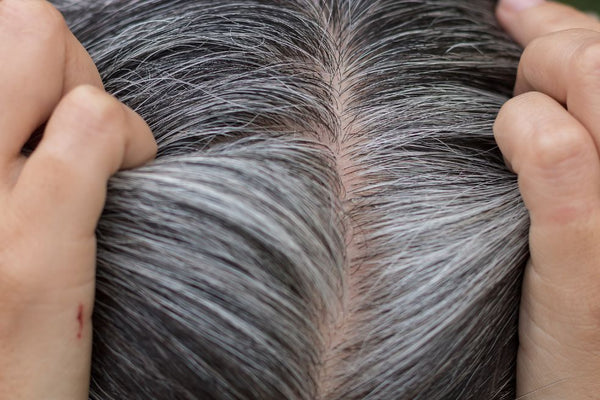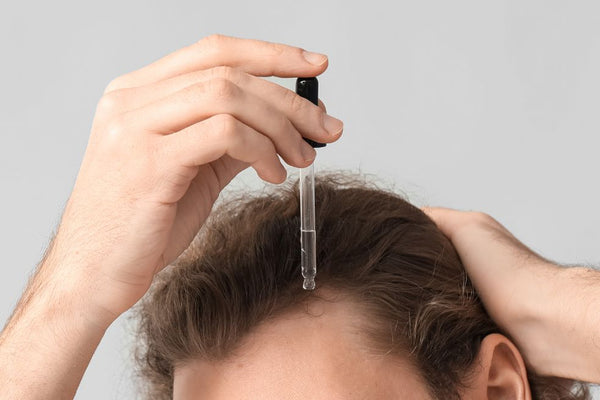Premature hair graying can often be a surprising and concerning occurrence for many individuals. It is the early loss of pigmentation in hair, occurring before the age of 20 or 30. While it might seem purely aesthetic, it can also be indicative of underlying health conditions or genetic predispositions.
It's important to understand the genetic components of premature graying since it sheds light on its inevitability for some individuals. Genetic predisposition plays a substantial role, often determining when and how early graying might occur.
Beyond genetics, health conditions can also accelerate premature gray hair. Factors like thyroid disorders, vitamin deficiencies (particularly B vitamins), and certain autoimmune conditions contribute significantly to premature hair graying.
Find out more on how thyroid disorders causes hair loss.
In this comprehensive article, we’re going to shed some light on premature hair greying, its causes, and how you can prevent it.
Is Premature Gray Hair Normal?
Premature gray hair refers to hair strands losing their natural color and turning gray before the typical age of around 40 years old. While it's considered normal for hair to gradually turn gray as you get older, premature graying at a young age may not be normal.
Premature graying can affect people of all ethnicities and genders. It's usually not a cause for concern from a medical perspective unless it's widespread over your head. Genetics play a big role, so if your parents or grandparents went gray early, you're also more likely to. Other factors, such as stress, nutrient deficiencies, and certain health conditions, can cause premature graying of hair in some individuals.
Why Does Hair Turn Gray?
Hair turns gray when the pigment-producing cells in our hair follicles, called melanocytes, slow down or stop producing color. As a result, new hair grows in with less color, appearing gray, silver, or white. The pigment loss can happen naturally as we age due to genetics or certain health conditions. That's why some people might see premature gray hair(in their 20s), while others only gray much later.
What Causes Premature Hair Graying at Early Age?

Hair turning gray before its time can be surprising and worrying. While it's normal for hair to lose color as we age, some people notice gray hairs much earlier than expected. Let's look at the causes of premature graying of hair.
1. Genetics
Genetics can play a role in causing premature gray hair. If your parents or close relatives experienced early graying, there's a higher chance that you might as well. Genes responsible for hair color can be inherited and lead to premature loss of color in hair strands.
2. Stress
While it’s not a direct cause, excessive stress can contribute to premature graying. It triggers our body to produce more cortisol that might affect melanin production, leading to graying of hair.
3. Nutritional Deficiencies
Lack of certain vitamins and minerals, particularly vitamin B12, vitamin D, iron, and copper, can affect hair color and health. If you're missing these nutrients, your hair's pigment cells can stop working properly, leading to premature graying.
4. Health Conditions
Some illnesses and medical issues can turn your hair gray before it's time. Medical conditions like thyroid disorders, vitiligo, autoimmune diseases, and some rare genetic conditions can lead to premature hair graying. They can disrupt the balance of hormones in the body and cause premature gray or white hair.
5. Smoking
Some studies also suggest that smoking might increase the risk of premature hair graying due to the harmful effects of smoking on the melanocytes responsible for hair color.
6. Chemical Exposure
Certain chemicals and harsh substances can damage your hair and lead to premature gray hair too soon. Things like hair dyes and other strong hair products contain chemicals that can affect the pigment cells in your hair follicles and might accelerate the graying process.
How Does Stress Cause Premature Hair Graying?
Stress doesn’t have a direct relationship with premature hair graying, but it is believed to contribute to it indirectly. The exact mechanisms that link stress to premature graying are entirely clear. However, there are some hypotheses.
Stress can trigger the release of hormones like cortisol, which might interfere with melanocyte function. Melanocytes are the cells which are responsible for producing melanin, the pigment that gives hair its color. When these cells are affected, it can lead to a decrease in melanin production, resulting in hair graying.
Stress can also lead to an increase in oxidative stress within the body. The imbalance between antioxidants and free radicals can affect various bodily functions, including the health of hair follicles and the production of melanin.
Chronic stress can also lead to low-grade inflammation in the body, which may impact the hair follicles and the melanocytes, potentially accelerating the graying process.
Find out how stress can leads to hair loss.
How to Prevent Hair Graying?
Preventing premature hair graying completely isn’t always possible, especially if genetics play a significant role. However, some strategies might help delay or minimize the onset of premature graying:

1. Healthy Diet: Ensure that you have a balanced diet rich in vitamins, minerals, and antioxidants. Foods like leafy greens, nuts, seeds, fruits, and lean proteins support overall hair health. Foods rich in antioxidants, vitamins B12, copper, iron, and protein can nourish hair follicles and support natural pigment production. A diet lacking these essential nutrients may accelerate premature graying.
2. Manage Stress: Managing stress is an important preventive measure against premature graying of hair. Relaxation techniques like yoga, meditation, or regular exercise help preserve your natural colors.
3. Good Hair Care: Treat your hair gently. Avoid excessive heat styling, harsh chemical treatments, and tight hairstyles that can damage hair follicles.
Read More: How Does Heat Damage Hair & How to Fix It?
4. Vitamin Supplements: Consult a healthcare professional about supplements if you have deficiencies in vitamins and minerals linked to hair health, like vitamin B12, vitamin D, iron, and copper.
5. Avoid Smoking: If you smoke, quitting might not only benefit your overall health but also could potentially reduce the risk of premature graying.
6. Natural Remedies: While their efficacy varies, some natural remedies like amla, rosemary oil, or coconut oil might support hair health.
7. Regular Hair Care Routine: Use hair care products suited to your hair type and condition. A nourishing routine with mild shampoos, conditioners, and occasional deep conditioning treatments can help maintain hair health and delay premature graying.
8. Regular Scalp Massage: Messaging the scalp regularly might stimulate blood flow to the hair follicles, supporting overall hair health.
9. Early Detection and Treatment: If graying is due to an underlying health condition, early detection and treatment might help slow down the graying process.
10. Genetic Counseling: Understanding your family history of premature graying through genetic counseling might provide insights into your risk and allow you to take preventive measures.
Can Catalase Help With Premature Hair Greying?
Catalase is an enzyme that breaks down hydrogen peroxide into water and oxygen. One theory behind premature hair graying suggests that a buildup of hydrogen peroxide in hair follicles due to decreased catalase activity might contribute to the bleaching of hair by reducing melanin production.
However, there’s limited scientific evidence supporting the use of catalase supplements or topical applications to reverse or prevent premature graying. Some products even claim that catalase supplementation can restore natural hair color by breaking down hydrogen peroxide, but the effectiveness of such products is not well-substantiated through robust scientific studies.
While catalase might have a role in the graying hair process by reducing hydrogen peroxide accumulation, premature hair graying is a complex issue influenced by various factors, including genetics, oxidative stress, and other enzymatic activities. There is limited research on catalase’s direct effect on reversing or preventing premature gray hair and more evidence is needed to establish its efficacy.
How Theradome Works for Premature Gray Hair Treatment
Theradome is a laser hair growth device that is used to stimulate hair growth and improve hair health. Although there isn’t substantial evidence that supports the efficacy of LLLT devices to reverse or prevent hair graying, LLLT devices can enhance hair follicle health and potentially increase blood circulation in the scalp. It could indirectly support healthier hair and possibly delay some aging-related changes, which might include graying to some extent.
Unlock the potential for healthier, fuller hair with Theradome's innovative laser therapy devices. Discover a new level of hair rejuvenation and take charge of your hair health today.
Conclusion
Premature gray hair can be a worry, but it's often a natural part of life. While we can't always stop it, we can take steps to keep our hair healthy. Eating well, managing stress, and taking care of our hair can help. Some people try supplements or special treatments, but these might not work for everyone. Remember, gray hair isn't a sign of unhealthy hair. If you're concerned, talking to a doctor can help. They can check if there's a health issue with premature hair graying. Ultimately, whether you embrace your gray hair or try to prevent it, the most important thing is to feel good about yourself.






















